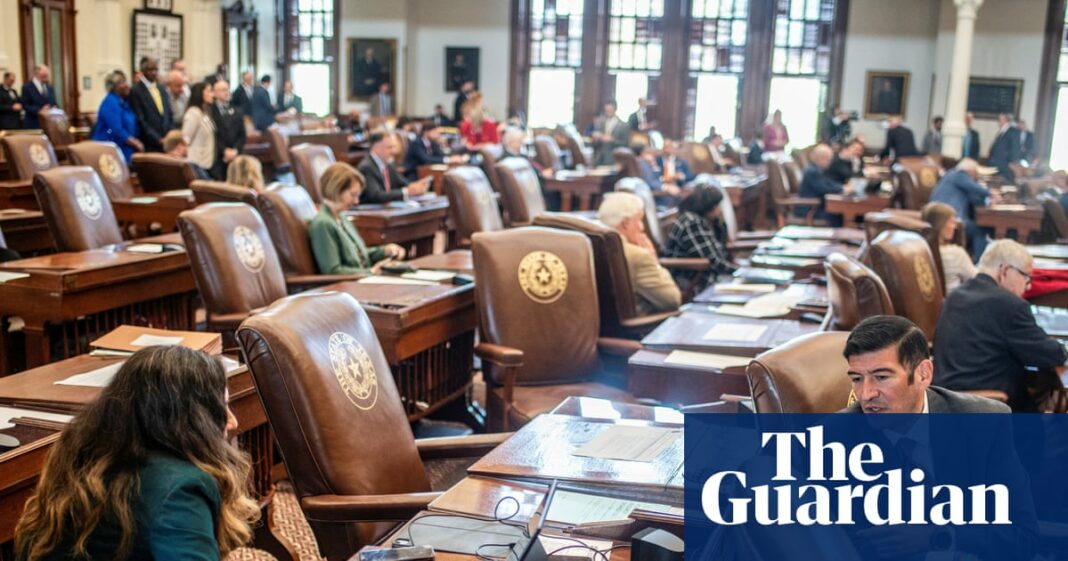Texas Republicans brought a bill to the floor of the state legislature on Wednesday to redraw the state’s congressional districts, making quick use of their regained quorum after the return of protesting Democratic legislators.
Democratic state representatives filed a series of amendments to the bill which were voted down, but used the process to raise objections to taking up redistricting before flood relief, to house rules which require a police escort when leaving the chamber and to the proposal itself, a mid-decade change which they argue reduces the voting power of people of color in service to Republican political gains and further gerrymanders the state at the cost of democracy.
“We’re ready to meet Trump where he is, which is on a dirt road,” said Democrat Nicole Collier, livestreaming from a bathroom off the legislative floor. “We’re ready to get down and dirty.”
Collier refused to sign a pass and permit a police escort for leaving the House floor, and has been trapped in the chambers as a result. While on a Zoom call with the Democratic senator Cory Booker of New Jersey and the Democratic National Committee chair, Ken Martin, Collier said she was being told she had to end the live stream or face a felony charge, abruptly leaving the meeting.
It is emblematic of the unusual resistance Democrats in Texas have put up to the redistricting bill, and the response of the Republican-controlled Texas government to that resistance.
“This bill intentionally discriminates against Black and Hispanic Texans and other Texans of color by cracking and packing minority communities across the state of Texas,“ said Chris Turner, a Democratic representative from Arlington. “It is a clear violation of the Voting Rights Act and the constitution.”
Republican leaders rejected racial animus as an element of the redistricting, noting that it increases the number of districts with a Hispanic voting age majority from seven to eight. Based on voting results from 2024, five congressional seats would change party from Democratic to Republican under the new map, which they argue is legally allowed.
“You want transparency,” said representative Todd Hunter, the Corpus Christi Republican who drafted the redistricting bill. “The underlying goal of this plan is straightforward: improve Republican political performance … We are allowed to draw congressional districts on the basis of political performance, as recognized by the US supreme court in Rucho v Common Cause. These districts were drawn primarily using political performance to guide the redrawing of districts.”
The strong assertion that the genesis of the redistricting is about increasing the number of Republicans in Congress, and not to diminish the voting power of people of color, is an early defense to expected legal challenges to the proposal under the Voting Rights Act.
“When you say the word ‘redistricting’, I think you know there are going to be legal challenges,” Hunter said.
Under the Voting Rights Act and longstanding court precedent, lawmakers needed to draw lines with great awareness of the racial composition of the electorate in order to avoid unconstitutionally packing them into single districts to reduce their influence on other districts, or to spread them across multiple districts – cracking – to dilute their voting strength as a group.
Talk of a mid-decade redistricting began in Texas after the Department of Justice circulated a letter describing the use of race in the state’s 2021 redistricting to be unconstitutional. Texas’s governor, Greg Abbott, seized on this as a rationale to redraw district lines more advantageous to Republicans. Donald Trump has called for Texas and other states to redraw their lines for more partisan advantage, prompting California’s governor, Gavin Newsom, and other Democratic governors to begin to counter with redistrictings of their own.
after newsletter promotion
Democrats in the Texas house left the state last month, intent on denying a quorum to the legislature to block a vote on the redistricting bill. They abandoned their exile after the California legislature began advancing a redistricting bill of its own.
In contentious discussion, state representative Barbara Gervin-Hawkins, the ranking Democrat on the Texas house redistricting committee, pressed Hunter on the motivations behind the new map lines and on the absence of input from the Texas legislative into a map that would probably face a voting rights challenge.
That drew a sharp response from Hunter.
“You left 17 to 18 days! You could have sat with me,” Hunter said.
“Now you’re getting on the microphone saying why didn’t I involve you? Well, I wasn’t going to cross state lines to find ya! I was here … You own the walkout. You said you did that. But don’t come into this body and say we didn’t include you. You left us for 18 days.”



